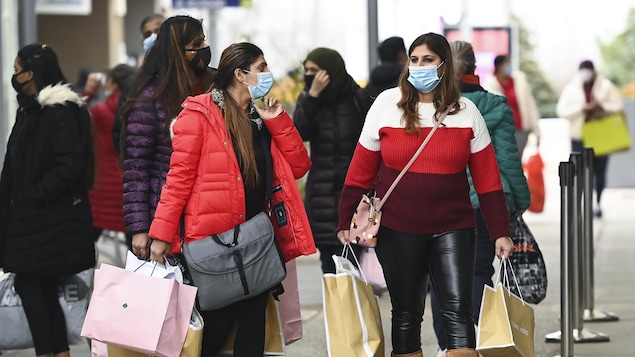The gradual opening of the recent borders may herald a return to pre-COVID-19 consumption habits. But it seems that crossings on both sides are still limited.
The pandemic is not the only factor changing consumption habits associated with Black Friday.
The event has been an important history for American companies for decades. But in Canada, its importance has essentially grown over the past 10 years, says David Superman, professor of marketing at the University of Toronto’s Rotman School of Management.
The researcher determines that this day has developed significantly: promotions offered by stores are now spread over a period of two weeks, and online purchases have increased significantly.
Limited cross-border shopping
In a border town like Windsor, Ontario, merchants don’t seem to be dealing with American shoppers coming in this year’s discount period.
We do not expect the volume of US travelers to return to pre-COVID-19 levels
, explains Rakesh Naidu, Rakesh Naidu, President of the Windsor-Essex Chamber of Commerce.
According to him, PCR testing is one of the current major obstacles to access for American consumers. He remembers that the Canadian government has announced that this obligation will be lifted for Canadian residents who stay less than 72 hours in the United States from November 30, but that Americans will remain subject to this measure.
We would like to abandon it as soon as possible, it is an obstacle to their coming
, he explains.
Focus on the local level
To ensure businesses attract Canadian consumers, the Windsor Chamber of Commerce has created an initiative called We support local. This online platform, which lists several local companies, especially offers a promotion for the delivery of purchases to relatives.
On the contrary, companies in Windsor do not seem to fear a mass departure of local customers to the US. COVID-19 infection rates are significantly higher in Michigan, which appears to be a burden for their passage.
Michigan has recorded more than 1.4 million cases since the beginning of the pandemic, compared to fewer than 600,000 cases in Ontario. However, the US state has a population of 10.2 million, while the Canadian province has a population of 14.7 million.
Amy O’Rourke, who works in a children’s clothing store Oshkosh Carterconfirms this trend. According to her, Canadian customers will remain in the country, primarily out of fear of contracting COVID-19 in the United States.
David Superman also believes that border crossings will be reduced this year. In my opinion, few Canadians will cross the border because testing is still mandatory
.
However, some companies are exceptions: those that rely primarily on American customers. This is the case for Amour Fragrances. To continue to attract customers, this year it offers a huge discount on purchases and bets on online shopping.
Consumption habits that can continue
David Superman believes that new domestic consumption habits can persist even after PCR tests are lifted.
We are objects of habit. Once we do something, we keep doing it for a long time. Even with the borders open, people won’t come back right away, it will take some time
.
« It will probably take. […] Months before the traffic we saw before the pandemic for US shopping. »
Benoit Duguay, full professor in UQAM’s School of Management Sciences, agrees. Tourism, for example, will change profoundly when borders are fully opened. And consumption too.
It adds Habits changed. And very smart who can say that everything will be back to how it was before.
Maram Kayali is part of this trend. She used to spend Black Friday in Detroit before the pandemic.
But this year, she no longer sees the target. I guess we used to do the local shopping, you don’t have to cross the border anymore because most stores honor Black Friday now, they have great deals too
, she explained.
In addition, some residents like to consume locally to support local merchants.
This is the case of Louise Toulouse. you remember that Everyone has struggled here, as in the United States, so why not help our people and our country? Since the pandemic, many people feel it is better to keep all business alive here and not there
.
Of the five residents interviewed for this report who want to shop on Black Friday, only one intends to shop in the United States.
Windsor-based Saurabh Katara is not thinking about changing her Black Friday routine. For a PCR test, which can run up to $250, he estimates the discounts he’ll find in Detroit will be able to amortize that cost.

“Alcohol scholar. Twitter lover. Zombieaholic. Hipster-friendly coffee fanatic.”

